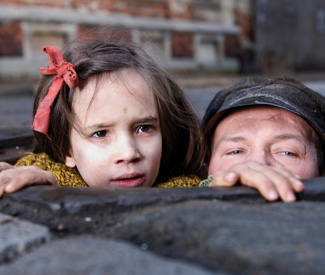FILM Agnieszka Holland is that kind of filmmaker who can become a well known, respectable veteran without anyone being quite sure what those decades have added up to. Her mentor was Andrzej Wadja, the last half-century’s leading Polish director (among those who never left). He helped shape a penchant for heavy historical drama and a sometimes clunky style not far from his own.
Since the late 1970s the result has been numerous great or at least weighty themes tackled head-on, with variable success. Following some well-received works at home, she commenced her international career with 1985’s Angry Harvest, about the amorous relationship between a Polish man and the Austrian, a Jewish woman, he hides during Nazi occupation. Very seldom inhabiting the present in her films, she’s approached classic children’s lit (1993’s The Secret Garden) and Henry James (1997’s Washington Square) with the same slightly ham-fisted competence.
She’s bolstered the notion of artistic genius being irascible via Ed Harris going Pollock on the ivories in 2006’s Copying Beethoven, and of Rimbaud and Verlaine shocking the bourgeoisie in 1995’s Total Eclipse. To Kill a Priest (1988) and The Third Miracle (1999) dealt with the uneasy relationship between faith, politics, and the Catholic Church in Poland. Less conspicuously, Holland has worked for hire on TV movies (one about murderer Gary Gilmore, another about murder victim Gwen Araujo) and series episodes (The Wire, Treme) that must rate among her least personal projects — as well as her finest.
http://www.youtube.com/watch?v=0LV4JJPZCwI
Her one indispensable feature is 1990’s Europa, Europa, an ideal vehicle for her favored mix of the grotesque, sober, and factual — following a Jewish boy who passed as Aryan German, to the point of joining the Hitler Youth. The new In Darkness is her best since then, and it can’t be chance that this too dramatizes a notably bizarre case of real-life peril and survival under the Nazis.
Its protagonist is Leopold Socha (Robert Wieckiewicz), an ordinary family man in Lvov (Poland then, Ukraine now) who’s not above exploiting the disarray of occupation and war to make ends meet. A sewer inspector, he uses his knowledge of underground tunnels to hide Jews who can pay enough when even the fenced-off ghetto is no longer safe. It’s late in the war; all avenues of flight are closed. The dozen or so citizens Socha secretes in the city’s bowels — freezing amidst vermin and waste — run a gamut despite shared panic. They include a professor, a junkie, a philanderer and mistress, and children. Extreme adversity doesn’t ennoble them — even in this dank entrapment there occur betrayals, fights, a bastard pregnancy. It is typical of Holland that when copulation and masturbation occur, the acts are at once furtively shameful and barnyard-frank.
Though both sides risk all, the “Polacks” openly disdain the “Yids,” and vice versa. In any other circumstance they’d happily snub one another. Only the flat brutality of the Nazis, gloating and laughing as they kill, can impose a thin allegiance. Yet as grueling months go by under constant threat of capture, something more than sheer dependency develops. Reluctantly, Socha finds himself unable to abandon “his” Jews even when they can no longer pay, and discovery would cost his life as well as theirs.
Holland will never be a cinematic poet. Her blunt, sometimes graceless approach to any story can leach its emotional subtleties as well as (more usefully) potential forced bathos and uplift. In Darkness has a few sequences poorly shaped enough to seem pointless. It takes us longer than it should to sort out all the major characters, and the sense of time passing is murky at best.
But for such a long, oppressive, and literally dark film, this one passes quickly, maintaining tension as well as a palpable physical discomfort that doubtlessly suggests just a fraction what the refugees actually suffered. On rare instances when Socha or others venture outdoors, sunlight feels as harsh and exposing as bleach.
In Darkness isn’t quite a great movie, but it’s a powerful experience. At the end it’s impossible to be unmoved, not least because the director’s resistance toward Spielbergian exaltation insists on the banal and everyday, even in human triumph.
In Darkness opens Fri/24 in San Francisco.

